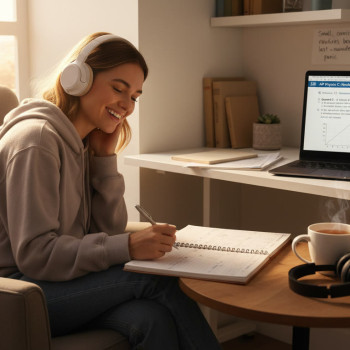Why a Summer Plan Matters (But Shouldn’t Consume Your Life)
Summer is a strange, golden window: long days, fewer deadlines, and the tempting promise of a real break. For AP students, it’s also an invitation — to get a head start on an upcoming course, recover from a tough year, or simply keep the brain rust-free. The trick is to use this time intentionally, not anxiously: build momentum without turning your vacation into a cram session. This guide gives a humane, realistic roadmap to sharpen AP skills, maintain curiosity, and arrive in class energized and ready to learn.

Start with a Gentle Self-Check
Before writing a single study block into your calendar, spend an hour reflecting. The point is to understand where you are so your summer plan fits you — not the other way around.
Questions to Ask Yourself
- Which AP subject(s) are you taking next year? What do those courses emphasize — content, writing, labs, or problem solving?
- What were your strengths and weaknesses this past year? Think skills (e.g., timed writing, data analysis, memorization) rather than vague labels.
- How much time can you realistically dedicate per week without sabotaging rest, family time, or other priorities?
- What motivates you? Are you aiming for a specific score, building content fluency, or just wanting a confident start?
Write down one to three concrete goals. Example: “By August 1, I will complete 10 AP-style practice FRQs for US History and review key chapters on causes of the Civil War,” or “I will master techniques for solving AP Calculus derivatives problems and do 30 minutes of practice three times per week.” Goals shaped this way are measurable, actionable, and kind to your mental bandwidth.
Design a Sustainable Weekly Rhythm
Instead of a rigid daily schedule that collapses after week two, build a rhythm: predictable, flexible, and satisfying. Think of rhythm as the scaffolding that lets you do serious work while still swimming, traveling, or sleeping late some days.
Sample Weekly Rhythms
- Light Rhythm (5–6 hours/week): 2 focused study sessions (60–90 minutes each) + a weekly cumulative review (60 minutes).
- Balanced Rhythm (8–12 hours/week): 3–4 study sessions (60–90 minutes) + one timed practice exam or essay every two weeks + active review.
- Intensive Rhythm (15+ hours/week): 5 sessions that mix content, practice questions, and full practice exams spaced to allow recovery.
Early summer, pick Light or Balanced. If motivation and energy are steady, gently ramp up. The most important design rule: alternate focused work with real rest. That is how learning consolidates.
What to Spend Your Time On: Skills Over Busywork
AP success rests on a few repeatable skills more than on sheer hours of reading. Focus your summer around the high-leverage activities that transfer directly to exam performance.
High-Leverage Summer Activities
- Targeted Content Review — short, active study sessions covering core units that typically appear on the exam.
- Skill Drills — timed multiple-choice practice, document analysis, free-response outlines, lab technique problems, or calculus derivations.
- Practice Under Real Conditions — occasional timed sections to build stamina and time awareness.
- Concept Mapping — visual summaries that link ideas across units (great for subjects like Biology, History, or Chemistry).
- Writing Practice — for AP Lang, History, and other essay-heavy exams: thesis practice, evidence organization, and synthesis drills.
Put It Together: A 6-Week AP Summer Plan Template
This template assumes a Balanced Rhythm. Tweak intensity, sessions, and topics according to your goals. Blocks of 60–90 minutes with clear objectives outperform marathon, unfocused sessions.
| Week | Focus | Weekly Tasks | Goal by End of Week |
|---|---|---|---|
| Week 1 | Orientation & Baseline |
|
Clear baseline and tailored plan |
| Week 2 | Core Content Chunk 1 |
|
Strong grasp of first major unit |
| Week 3 | Core Content Chunk 2 |
|
Practice applying knowledge under time |
| Week 4 | Skills and Practice |
|
Technique improvements and feedback loop |
| Week 5 | Mix & Repair |
|
Reduced weak spots and increased confidence |
| Week 6 | Consolidate and Recharge |
|
Ready to enter class with a clear action plan |
Practical Tools and Habits That Make It Easier
Small rituals keep momentum without adding pressure. These are practical, evidence-friendly habits you can adopt this summer.
Daily and Weekly Habits
- Micro Sessions: If 90 minutes feels long, do two 25–30 minute Pomodoro-style sessions with a break. Short, focused bursts beat tired, unfocused reading.
- Active Recall: Use flashcards, self-quizzing, or practice problems rather than passively re-reading notes.
- Mixed Practice: Interleave topics (e.g., alternate calculus differentiation problems with integration on different days) to improve retention.
- Scheduled Recovery: Put a non-negotiable rest block in your calendar — swim, hang with friends, or read for pleasure.
- Weekly Reflection: Spend 15 minutes each Sunday noting wins and adapting the plan.
How to Practice Without Burning Out
Burnout doesn’t come from working hard once in a while; it comes from chronic pressure without recovery. The antidote is structure that respects your limits and prioritizes psychological safety.
Practical Anti-Burnout Strategies
- Limit Deep Work: Keep deep study to 3–4 solid blocks per week; the brain needs downtime to consolidate learning.
- Mix Hard Tasks with Easy Wins: Pair challenging practice with something automatic and fast to boost motivation.
- Stay Social: Studying with a friend or in a study group once a week can make practice feel less isolating and can simulate classroom accountability.
- Set a Stop Time: Decide on a daily end time for any study — even on productive streaks, stop and rest.
- Celebrate Small Gains: Each skill you master is progress. Mark them visibly (calendar stickers, a progress board) to sustain momentum.
Use Evidence-Aligned Resources — and Use Them Smartly
The College Board offers great tools like AP Classroom, AP Daily videos, and released free-response questions. These resources are gold, but the key is how you use them.
Smart Ways to Use Official Resources
- Start with the Course and Exam Description to know what’s tested and how. Build your weekly plan around those skills.
- Use AP Daily videos for quick content refreshers — watch actively with notes and a short practice follow-up.
- Practice with released FRQs and scoring rubrics to understand expectations; then try scoring a peer’s response or your own.
- AP Classroom Topic Questions make excellent quick drills. Treat them like workouts: short, focused, and measurable.
When to Consider Personalized Help
Some students thrive alone; others make faster, steadier progress with tailored guidance. If you find yourself stuck on the same skill, losing motivation, or balancing multiple APs, 1-on-1 support can be efficient and confidence-building.
Sparkl’s personalized tutoring can fit naturally into a summer plan: targeted sessions on stubborn skills, tailored study plans that respect your schedule, expert tutors who give precise feedback, and AI-driven insights that identify the highest-impact practice items. Used selectively — for a few sessions to fix a pattern or build a master plan — tutoring can be a smart way to save time and stress.
Sample Mini-Plans for Different Subjects
Not every AP subject asks for the same preparation. Below are compact suggestions for common APs to help you adapt the general plan to your needs.
AP Biology
- Focus: Big-picture systems (cellular respiration, genetics), data interpretation, and lab skills.
- Weekly Tasks: One concept mapping session, one practice set of data-response questions, one lab-methods review.
AP US History
- Focus: Chronological frameworks, evidence-based argument writing, and synthesis of primary sources.
- Weekly Tasks: Two short DBQ outlines, one thematic timeline, and review of 20–30 key terms.
AP Calculus
- Focus: Procedural fluency (derivatives/integrals), conceptual understanding, and timed problem sets.
- Weekly Tasks: Alternating days of skills practice and conceptual review, plus one timed section per week.
Measure Progress Without Obsessing Over Scores
Score chasing every week is a fast track to anxiety. Instead, use a few reliable markers to guide adjustments:
- Skill Mastery Checklist: Track whether you can reliably explain, solve, or apply a concept without notes.
- Timed Section Accuracy: Track percent correct, but also the types of mistakes (careless, content, timing).
- Reflection Notes: Weekly notes about what changed — confidence, speed, ability to teach a topic to someone else.
Putting It All Together: A Realistic Daily Example
Here’s what a Balanced Rhythm day might look like during summer (about 90–120 minutes total):
- Late Morning (40 minutes): Quick warm-up — 10 minutes of flashcards, 30 minutes of focused concept work with a practice problem set.
- Afternoon (60 minutes): Deep session — a timed section or an FRQ draft, followed by 15 minutes of immediate review and error analysis.
- Evening (Optional, 20–30 minutes): Light review or planning for tomorrow; close study by a set time.
Keep It Human: Why Rest, Play, and Curiosity Matter
At the center of any successful summer plan is a student who still likes learning. Keep curiosity alive by mixing study with exploratory learning — read a popular book on a topic you love, watch a documentary that stretches your thinking, or tinker with a related hobby. Those experiences often produce the “aha” moments that make AP concepts feel meaningful instead of abstract.

Final Checklist: Before School Starts
- One-page course summary for each AP you’re taking (key formulas, dates, themes, and strategies).
- A realistic weekly schedule for the first six weeks of school that builds on what you did in the summer.
- One tutor session (or two) booked early if you want targeted support for the fall. A short series with an expert can dramatically shorten the learning curve at the start of class.
- A rest plan — vacations, family days, and a mental-health safety net for high-stress weeks like pre-exam season.
Parting Notes: Make Progress, Not Perfection
Success on AP exams grows from steady, targeted practice, not last-minute heroics. This summer, choose habits that compound: short consistent study blocks, active practice, and enough recovery so you arrive at the first day of class capable of curiosity and calm. Use official resources thoughtfully, measure what matters, and don’t hesitate to ask for help when a single tutor session could clear a recurring hurdle.
And remember: a summer well-spent isn’t one where you study constantly — it’s one where you come back to school smarter, steadier, and still yourself.


















No Comments
Leave a comment Cancel